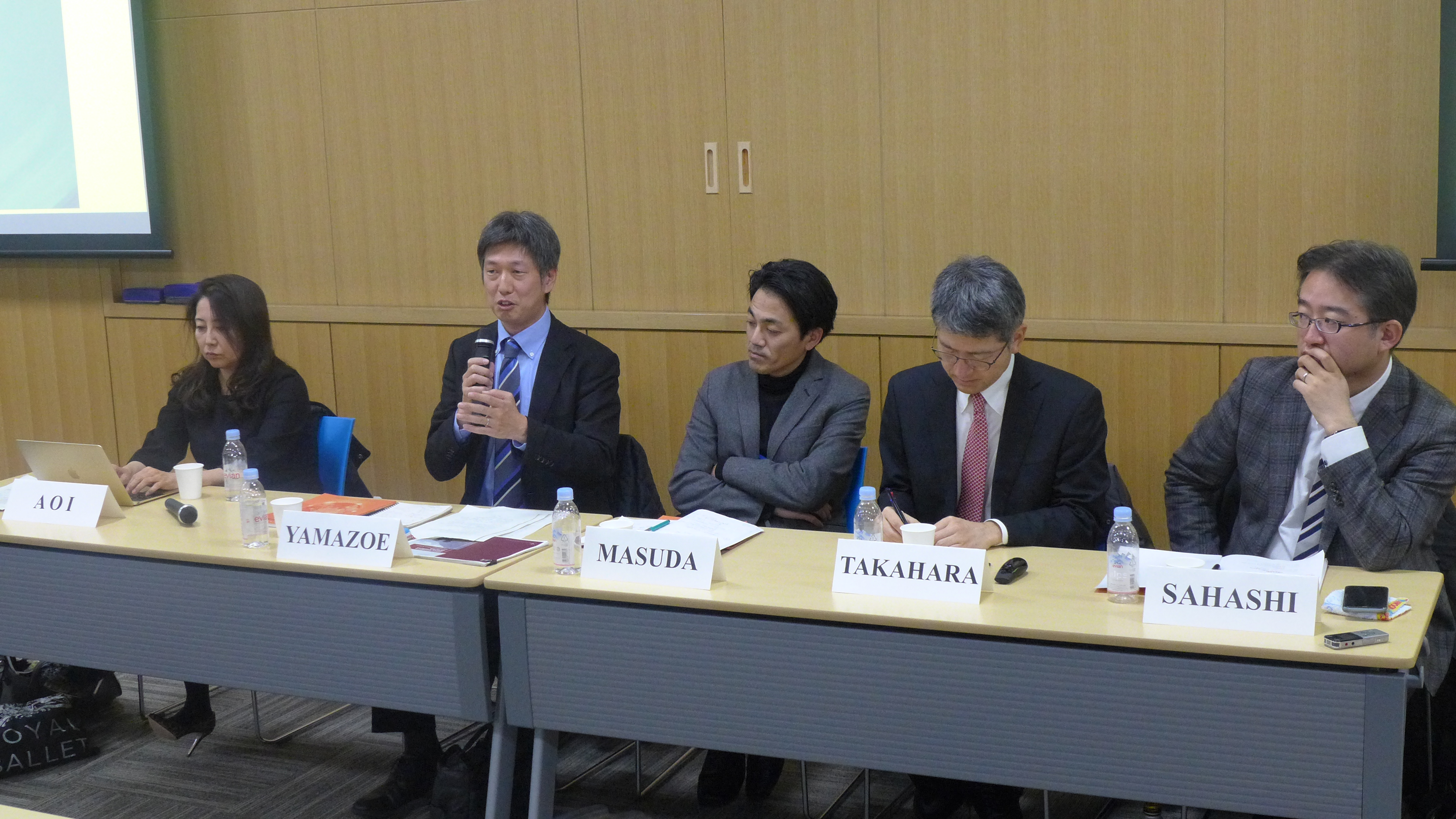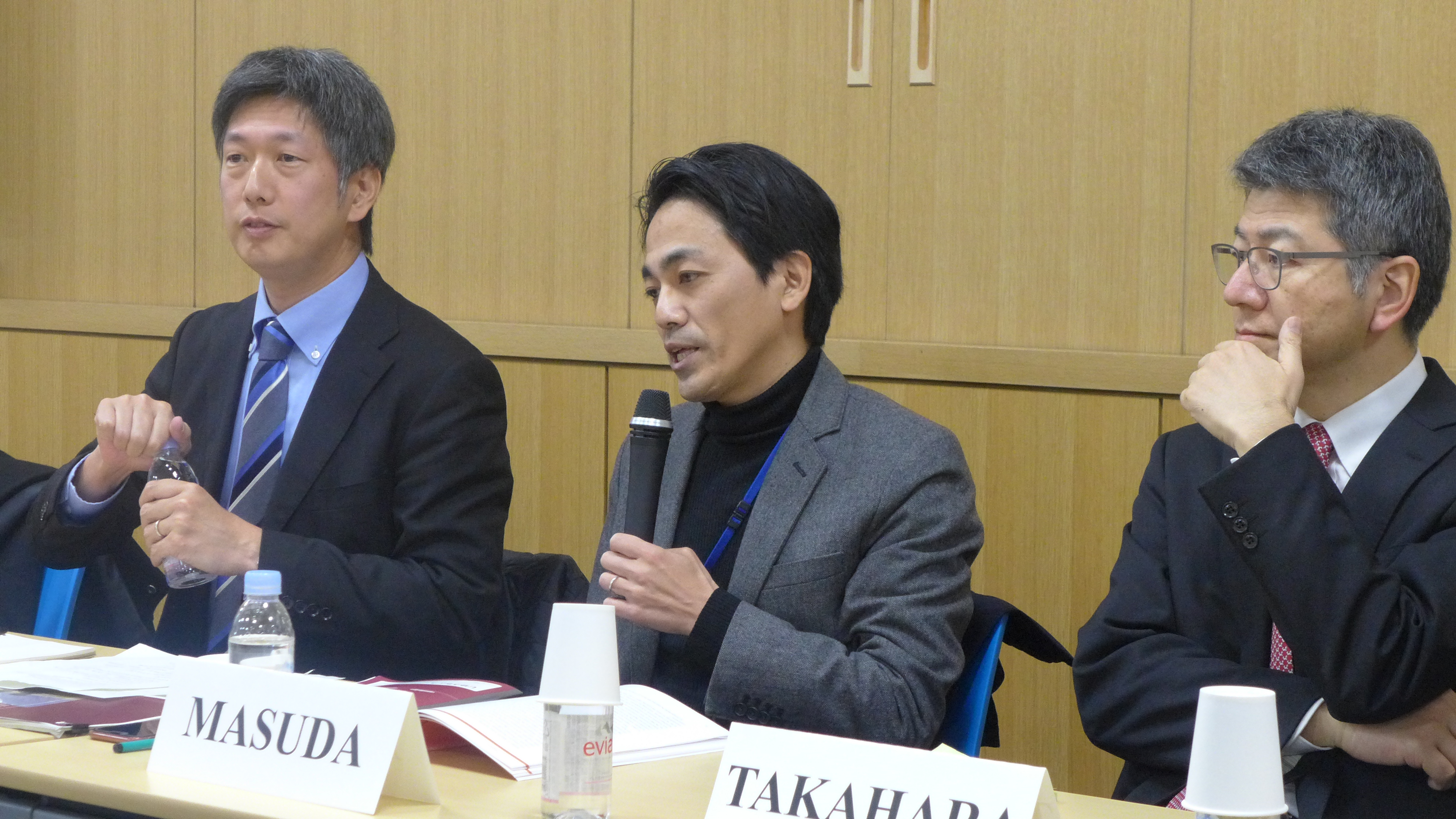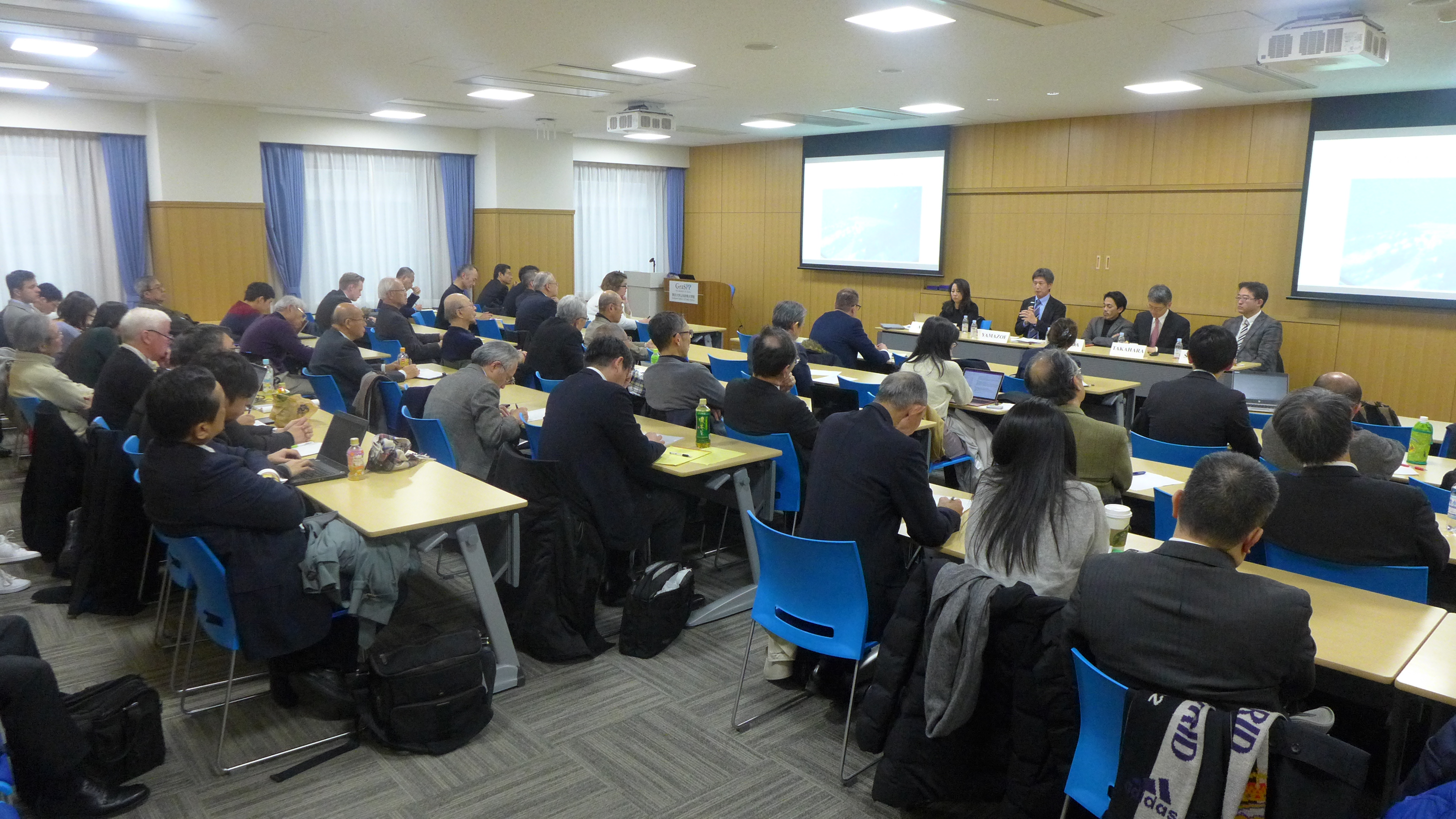SSU Forum/GraSPP Research Seminar China’s Approach to Eurasia: Its Visions and Impact
- Date:Tue, Jan 07, 2020
- Time:10:30-12:00
- Location:SMBC Academia Hall, 4F International Academic Research Building, The University of Tokyo
MAP - Subject:
“China’s Approach to Eurasia: Its Visions and Impact”
- Language:
English
- Hosts:
Security Studies Unit, Institute for Future Initiatives, the University of Tokyo
GraSPP Research Seminar, the University of Tokyo
The Institute for Future Initiatives and GraSPP Research Seminar collects personal information in order to provide you with information about our current and future activities. Your personal information will not be disclosed to any third party.
Speaker: MASUDA Masayuki, Senior Fellow, National Institute for Defense Studies (NIDS), Japan
Speaker: YAMAZOE Hiroshi, Senior Fellow, National Institute for Defense Studies (NIDS), Japan
Speaker: TAKAHARA Akio, Professor, Graduate School of Law and Politics and Dean of the Graduate School of Public Policy, The University of Tokyo
Speaker: SAHASHI Ryo, Associate Professor of International Politics, Institute for Advanced Studies on Asia, The University of Tokyo
Moderator: AOI Chiyuki, Professor, Graduate School of Public Policy, The University of Tokyo
China’s diplomacy with Eurasia, particularly the countries of Central Asia, is comprised of economic regionalism and diplomatic soft balancing against the United States. Yet, China did not find it always easy to form a unified position on the direction regionalism will take and how to deal with the United States with Russia and the Central Asian Republics. While Beijing still emphasizes the importance of regional multilateral cooperation on the one hand, bilateral relations dominates the approach to its neighbors in promoting the Belt and Road Initiative (BRI).
The Central Asian Republics, for example, have a different set of traditions from China such as civil and military bureaucracy conducted in Russian. Further, memory is still fresh from the 1960s border clash with China, resulting in a wide-spread fear of the Chinese expansion. There are sometimes demonstrations protesting the growing presence of Chinese in the region.
Beijing, having to take these factors into consideration in its approach towards Central Asia, adopted a careful approach, and ultimately such countries accepted such new Chinese initiatives as the Silk Road Economic Belt (SREB) vision, thus improving connectivity in economic relations between China and its regional neighbors. Seeking to protect that improving connectivity, Beijing is also advancing functional security cooperation with Eurasian countries, specifically law enforcement cooperation.
In this seminar, experts from the National Institute for Defense Studies (NIDS) and the University of Tokyo will discuss various policy issues surrounding China-Russia and China-Central Asia relations over issues such as the BRI, energy policy, and an emerging security architecture on the Eurasian continent. The global implications of developing diplomatic relations and economic connectivities in the region will be assessed.
*The NIDS China Security Report 2020 is the 10th in a series published by the National Institute for Defense Studies since 2011. The 2020 report analyzes China’s strategic trends on the Eurasian continent. The Japanese, English and Chinese editions of the report are accessible on the NIDS Website: http://www.nids.mod.go.jp/english/publication/chinareport/index.html
MASUDA Masayuki is Senior Fellow in the China Division at the National Institute for Defense Studies (NIDS). He joined NIDS in 2003 and has been Visiting Fellow at Shanghai University, Visiting Scholar at the East-West Center, and Visiting Academic at the Daniel K. Inouye Asia-Pacific Center for Security Studies (DKI APCSS). He has written a number of articles and books on Chinese foreign policy and security, the recent of which are “China’s Eurasian Diplomacy,” NIDS China Security Report 2020 (November 2019); Geopolitics in Contemporary Japan, co-author (Tokyo: Chuokoron-Shinsha, 2017); China as Major Power (Tokyo: Ichigeisha, 2017).
YAMAZOE Hiroshi is Senior Fellow at the National Institute for Defense Studies (NIDS). His research interests are mainly Russian security policy and international history in East Asia. He obtained an MA in Russian Studies from School of Slavonic and East European Studies, University College London in 2005, and a Ph.D in Human and Environmental Studies from Kyoto University in 2008. He has been working at NIDS since 2008 and was a visiting fellow at Royal United Services Institute (RUSI) in 2012. His works include “Chapter 2: The Growing Influence of China as Seen from Central Asia and Russia,” NIDS China Security Report 2020, NIDS, November 2019; “Sino-Russian Cooperation from the Perspective of the U.S.-Japan Alliance,” Asia Policy, vol. 13, no. 1, National Bureau of Asian Research, January 2018; “Russia’s Eastward Approach to East Asia: The Qing, Japan, and Boundary Issues with Russia” in Takashi Okamoto ed., A World History of Suzerainty: A Modern History of East and West Asia and Translated Concepts(Toyo Bunko, 2019).
Takahara Akio received his DPhil in 1988 from Sussex University, and later spent several years as Visiting Scholar at the Consulate-General of Japan in Hong Kong, the Japanese Embassy in Beijing, Harvard University, Peking University, and at the Mercator Institute for China Studies. Before joining The University of Tokyo, he taught at J. F. Oberlin University and Rikkyo University. He served as President of the Japan Association for Asian Studies, and as the Secretary General of the New Japan-China Friendship 21st Century Committee. He currently serves as Senior Fellow of the Tokyo Foundation for Policy Research, Senior Adjunct Fellow of the Japan Institute of International Affairs, and Distinguished Research Fellow of the Japan Forum on International Relations. His publications include The Politics of Wage Policy in Post-Revolutionary China, (Macmillan, 1992), and Japan-China Relations in the Modern Era, (co-authored, Routledge, 2017).
Sahashi Ryo specializes on international politics in East Asia. His recent book is In a Search for Coexistence: the United States and Two Chinas during the Cold War (Tokyo: Keiso, 2015). In English, he recently edited Looking for Leadership: The Dilemma of Political Leadership in Japan (Tokyo and New York: Japan Center for International Exchange, 2015), and wrote on the impact of rising China on Asian order, Japan’s security policy and Japan-Taiwan relations. Now he is writing his next book on US-China competition and leading two group studies on the alliance and order after the end of the Cold War.
Dr Sahashi has taught at Kanagawa University as professor until March, 2019 and has been Visiting Associate Professor, Walter H. Shorenstein Asia Pacific Research Center, Stanford University and Shigeru Yoshida Chair, Instituto Tecnológico Autónomo de México (ITAM). He joined Institute for Advanced Studies on Asia, the University of Tokyo from April, 2019.
Concurrently, he serves as Research Fellow, Japan Center for International Exchange and the member of UK-Japan 21st Century Committee. He regularly contributes to NHK, Nikkei, Asahi Shimbun, Mainichi Shimbun and other major media outlets.
He received his B.A. from International Christian University and his Ph.D. from the Graduate Schools for Law and Politics at the University of Tokyo. He also studied at Department of Political Science, University of Illinois at Urbana-Champaign. Born in 1978.
The Security Studies Unit (SSU) of the Institute for Future Initiatives (IFI), in collaboration with the Graduate School of Public Policy (GraSPP), was delighted to host a research seminar entitled “China’s Approach to Eurasia: Its Visions and Impacts”. Distinguished guest speakers were Dr. Masayuki Masuda and Dr. Hiroshi Yamazoe, both Senior Fellows at the National Institute of Defence Studies. Discussants were Ryo Sahashi, Associate Professor at the Institute of Advanced Studies on Asia, The University of Tokyo, and Professor Akio Takahara, Dean of the Graduate School of Public Policy as well as Professor of Chinese Politics. Chair of the session was Chiyuki Aoi, Professor of International Security at GraSPP.
In this event, Dr. Masuda and Dr. Yamazoe presented in line with their research results in the “NIDS China Security Report 2020: China Goes to Eurasia”, a publication of the National Institute of Defense Studies concerning China and Central Asia.

After Professor Aoi opened the event by briefly introducing the panelists, Dr. Masuda began his intervention by thanking the numerous public, and introduced the topic of his speech, namely China’s increasing influence on the broader Asian continent, particularly Central Asia. There were three main topics in his intervention, namely: 1) Providing an overview of China’s policy in Central Asia; 2) Investigating what the Chinese interests in the region are; 3) Providing a picture of the resulting security architecture.
According to Dr. Masuda, China, following the establishment of the Shanghai Cooperation Organisation (SCO) in 2001, embarked on a policy for the promotion of multilateral economic integration. The proposed establishment of a free trade area in the region, however, was met with scepticism, as it was not regarded as mutually beneficial by the other partners. Russia in particular, which is economically weaker than China, was and remains more eager to address cooperation in the military and security spheres, where it can have an advantage. In the early 2000s, China was also unsuccessful in creating a coordinated approach within SCO with reference to Afghanistan. From the late 2000s, Beijing embraced a new attitude towards Central Asia, with more bilateral rather than multilateral initiatives. These initiatives fit in three broader goals: a) The economic development of China’s western regions, which border Central Asia; b) the geopolitical stabilisation of the western theatre: whereas tensions exists on the eastern (maritime) front and with the US, Beijing has sought to stabilise the situation with countries to the West; c) since 2015, China has found fertile ground in the broader Asia continent with reference to its agenda for global governance reforms. This latter point is particularly evident when considering the establishment of AIIB, and the successive expansion of the Belt and Road Initiative (BRI). Finally, in terms of security cooperation, China has moved towards more pragmatic forms of cooperation. The construction of new connectivity infrastructures (gas and oil pipelines, road and rail links, electric power lines etc.) also means the necessity to coordinate its protection. This has led to the creation of ad hoc security fora, from which a new security architecture is emerging. In conclusion, Dr. Masuda remarked that Japan can no longer ignore these developments on the Eurasian landmass.

Dr. Yamazoe started his intervention by thanking the host and the public. As an expert on Russian affairs, he looks at the matter through the prism of Russian history and geopolitics. He made three main points concerning Central Asia. First, there are certainly opportunities for Beijing in the region, but also risks. Historically, borders in that area were established during the imperial era, often cutting across different ethnic groups. Russians have a large presence in Central Asia, where their culture has been historically dominant. Chinese culture and language is instead not fully established even on the Chinese side of the border. The increase in connectivity can be regarded as positive, but there may be dangers. Numerous former Soviet citizens remember for instance the border clashes of the 1960s-1970s. There is a clear resistance against Chinese firms working in some of the Central Asian countries, as well against Chinese land ownership. Second, the various countries of Central Asia should also be seen as actors seeking to play a geopolitical game stretching well beyond the confinements of the region. Kazakhstan for example has been very active in the establishment of a East-West connectivity axis. Cooperation, rather than hegemony, seems to be the real nature of the relation between China and Central Asia. On the security front, China maintains presumably dozens of soldiers in the southeastern corner of Tajikistan, most probably in order to monitor human trafficking and other kinds of smuggling. It appears in any case that China is conscious about Russia’s anxiety concerning the Chinese presence in the area, and Beijing actively intends to avoid frictions with Moscow. Central Asia countries appear to be interested in more interaction with actors other than Russia and China, certainly the EU and the US, but also Japan. Third, Dr. Yamazoe addressed the question of the Russian viewpoint on the matter. Moscow seems to be concerned about China’s growing presence, but the two countries are not on a collision course. Russia intends to pursue cooperation, with the intention to counter excessive Chinese influence. This is the rationale for providing China with the Russian military technology China will depend on, while rejecting too low tariffs in the proposed trade agreement with China. At the moment, both Beijing and Moscow seem to be satisfied by their mutual relations. If China becomes an economic threat, then Russia will need to take countermeasures of some kind.
Professor Takahara thanked Professor Aoi and the guest speakers, raising three points. 1) He recalled how the BRI came into being. When Xi Jinping came into power in 2013, his foreign policy strategy was to establish a new concept of great powers relations. Initially this was accepted by the Obama administration, but it proved untenable, since China’s actions in the South China Sea and elsewhere cooled relations with Washington. The BRI emerged from this failure, as a way to re-shape China’s foreign policy. More in general, it is possible to observe that the pendulum of China’s foreign policy swings towards Eurasia when the relations with America deteriorate. 2) China is a pragmatic country. The BRI is not only and perhaps not even primarily a geopolitical project or grand plan, but it is primarily business. Some of the projects related to the BRI, for instance the port of Gwadar in Pakistan, are not at all profitable. It is increasingly important for China to go ahead only with those projects which can produce profits. Unfortunately it appears that many projects concerning Central Asian nations are not profitable from a sheer financial perspective. 3) Until not many years ago, Russia feared a Chinese mass immigration and takeover of its easternmost territories, which are only sparsely inhabited. This has not happened. On the contrary, Russia currently wishes to attract more investors in those regions, but the Chinese do not seem to prioritise Russia and Central Asia as one of the top destinations of their investments.
Professor Sahashi as well thanked the host and the guests, and proceeded to deliver some comments and questions. The first question is whether the politics of Eurasia, or Central Asia, should be framed as a global or a regional security problem. Professor Sahashi thinks it is largely regional. The US position in the area (except Afghanistan) is for instance not a top priority for Washington, comparable with other parts of the world. Even Chinese activities in the region appear to be low-key, and more in general, it is difficult to understand what China’s strategic interests are. Another question pertains the relations between China and Russia. Much has changed in the past two decades, with Beijing becoming a global economic giant. Is Russia ready to accept the “junior partner” role? Furthermore, other actors seem to have been left out of the conversation, for instance India, whose interest in Afghanistan should not be underestimated. The US used to express interest in Central Asia in the late 1990s and early 2000s, but Washington does not seem particularly serious on this region anymore. Finally, what can be the interest of Japan? Professor Sahashi remarked that, in his view, and apart from the questions of energy and terrorism, Central Asia cannot be regarded as particularly important from Tokyo’s perspective.

In the exchange that followed, Dr. Masuda responded to Professor Takahara on Russia, noticing that Russia initiated most of the political activities in Central Asia, including the creation of SCO, but China has then expanded those initiatives. To Sahashi sensei, he responded that China’s main interest in the region is energy: China is now the largest energy importer of the world. As for Japan, economic cooperation is a way to remain involved, particularly through the sale of high quality infrastructures.
Dr. Yamazoe responded then to both Professor Takahara and Professor Sahashi, pointing out how Russia does not seem to have a clear vision about its future. Some Russian observers have some serious questions about the Russia-China relations and their imbalances. It appears that the Russian leadership is somewhat pretending to be an equal partner of Beijing, even if this cannot be the case in the economic sphere. In Russia, there is no progress related to the BRI. Their current approach is to try to present their advantages in military affairs as a merit in the eyes of the Chinese.
※This forum was organized in connection with the MOFA subsidy projects granted to SSU of IFI.